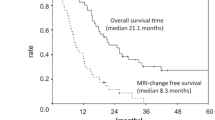Abstract
Preclinical data have demonstrated that ionizing radiation acts synergistically with capecitabine. This report retrospectively assessed the use of capecitabine concurrently with whole-brain radiotherapy (WBRT) in patients with brain metastases from breast cancer. From January 2003 to March 2005, five breast cancer patients with brain metastases were referred for WBRT with concurrent capecitabine. Median age was 44 years (range: 38–53). The median dose of capecitabine was 1,000 mg/m2 twice daily for 14 days (day1–14). Treatment cycles were repeated every 21 days, concurrently with WBRT (30 Gy, 3 Gy per fraction, 5 days per week). Median survival after starting WBRT plus capecitabine was 6.5 months (range 1–34 months). One patient achieved a complete response. Two patients achieved partial response, including one with local control lasting until most recent follow-up. One patient had stable disease. The remaining patient was not assessable for response because of early death. Most commonly reported adverse events were nausea (n = 2) and headache (n = 2), always grade 1. Other toxicities were grade 3 hand/foot syndrome (n = 1), moderate anemia requiring transfusion and dose reduction of capecitabine (n = 1), and grade 1 mucositis (n = 1). Although promising, these preliminary data warrant further assessment of capecitabine-based chemoradiation in brain metastases from breast cancer and need to be further validated in the setting of a clinical trial.
Similar content being viewed by others
References
Weil RJ, Palmieri DC, Bronder JL et al (2005) Breast cancer metastasis to the central nervous system. Am J Pathol 167:913–920
Tsukada Y, Fouad A, Pickren JW et al (1983) Central nervous system metastasis from breast carcinoma. Autopsy study. Cancer 52:2349–2354. doi:10.1002/1097-0142(19831215)52:12<2349::AID-CNCR2820521231>3.0.CO;2-B
Borgelt B, Gelber R, Kramer S et al (1980) The palliation of brain metastases: final results of the first two studies by the Radiation Therapy Oncology Group. Int J Radiat Oncol Biol Phys 6:1–9
Sawada N, Ishikawa T, Sekiguchi F et al (1999) X-ray irradiation induces thymidine phosphorylase and enhances the efficacy of capecitabine (Xeloda) in human cancer xenografts. Clin Cancer Res 5:2948–2953
Wang MLH, Yung WKA, Royce ME et al (2001) Capecitabine for 5-fluorouracil resistant brain metastases from breast cancer. Am J Clin Oncol 24:421–424. doi:10.1097/00000421-200108000-00026
Rogers LR, Remer SE, Tejwani S (2004) Durable response of breast cancer leptomeningeal metastasis to capecitabine monotherapy. Neuro-oncol 6:63–64. doi:10.1215/S1152851703000334
Giglio P, Tremont-Lukats IW, Groves MD (2003) Response of neoplastic meningitis from solid tumors to oral capecitabine. J Neurooncol 65:167–172. doi:10.1023/B:NEON.0000003752.89814.ca
Tham YL, Hinckley L, Teh BS et al (2006) Long-term clinical response in leptomeningeal metastases from breast cancer treated with capecitabine monotherapy: a case report. Clin Breast Cancer 7:164–166. doi:10.3816/CBC.2006.n.028
Siegelmann-Danieli N, Stein M, Bar-Ziv J (2003) Complete response of brain metastases originating in breast cancer to capecitabine therapy. Isr Med Assoc J 5:833–834
Fabi A, Vidiri A, Ferretti G et al (2006) Dramatic regression of multiple brain metastases from breast cancer with capecitabine: another arrow at the bow? Cancer Invest 24:466–468. doi:10.1080/07357900600705805
Miwa M, Ura M, Nishida M et al (1998) Design of a novel oral fluoropyrimidine carbamate, capecitabine, which generates 5-fluorouracil selectively in tumours by enzymes concentrated in human liver and cancer tissue. Eur J Cancer 34:1274–1281. doi:10.1016/S0959-8049(98)00058-6
Gaspar L, Scott C, Rotman M (1997) Recursive partitioning analysis (RPA) of prognostic factors in three Radiation Therapy Oncology Group (RTOG) brain metastases trials. Int J Radiat Oncol Biol Phys 43:745–751. doi:10.1016/S0360-3016(96)00619-0
Murray KJ, Scott C, Greenberg HM et al (1997) A randomized phase III study of accelerated hyperfractionation versus standard in patients with unresected brain metastases: a report of the Radiation Therapy Oncology Group (RTOG) 9104. Int J Radiat Oncol Biol Phys 39:571–574. doi:10.1016/S0360-3016(97)00341-6
DeAngelis LM, Delattre JY, Posner JB (1989) Radiation-induced dementia in patients cured of brain metastases. Neurology 39:789–796
Wadasadawala T, Gupta S, Bagul V, Patil N (2007) Brain metastases from breast cancer: management approach. J Cancer Res Ther 3:157–165
Pinedo HM, Peters GF (1988) Fluorouracil: biochemistry and pharmacology. J Clin Oncol 6:1653–1664
Seiwert TY, Salama JK, Vokes EE (2007) The concurrent chemoradiation paradigm––general principles. Nat Clin Pract Oncol 4:86–100. doi:10.1038/ncponc0714
Lawrence TS, Tepper JE, Blackstock AW (1997) Fluoropyrimidine-radiation interactions in cells and tumors. Semin Radiat Oncol 7:260–266. doi:10.1016/S1053-4296(97)80024-0
McGinn CJ, Lawrence TS (2001) Recent advances in the use of radiosensitizing nucleosides. Semin Radiat Oncol 11:270–280. doi:10.1053/srao.2001.26002
McEvoy GK (ed) (2002) Capecitabine. In: AHFS drug information. American Society of Health-System Pharmacists, Bethesda, MD, pp 916–921
Heier MS, Heintz R, Fossa SD (1986) Passage of 50-dFUrd and its metabolites 5-FU and 5-FUH2 to CSF in a clinical phase 1 study. Acta Neurol Scand 74:240–244
Loo WT, Sasano H, Chow LW (2007) Evaluation of therapeutic efficacy of capecitabine on human breast carcinoma tissues and cell lines in vitro. Biomed Pharmacother 61:553–557. doi:10.1016/j.biopha.2007.08.014
Ekenel M, Hormigo AM, Peak S, Deangelis LM, Abrey LE (2007) Capecitabine therapy of central nervous system metastases from breast cancer. J Neurooncol 85:223–227. doi:10.1007/s11060-007-9409-0
Rivera E, Meyers C, Groves M et al (2006) Phase I study of capecitabine in combination with temozolomide in the treatment of patients with brain metastases from breast carcinoma. Cancer 107:1348–1354. doi:10.1002/cncr.22127
Addeo R, Caraglia M, Faiola V et al (2007) Concomitant treatment of brain metastasis with whole brain radiotherapy [WBRT] and temozolomide [TMZ] is active and improves quality of life. BMC Cancer 7:18. doi:10.1186/1471-2407-7-18
Carmona-Bayonas A (2007) Concurrent radiotherapy and capecitabine, followed by high-dose methotrexate consolidation, provided effective palliation in a patient with leptomeningeal metastases from breast cancer. Ann Oncol 18:199–200. doi:10.1093/annonc/mdl290
Hikino H, Yamada T, Johbara K et al (2006) Potential role of chemo-radiation with oral capecitabine in a breast cancer patient with central nervous system relapse. Breast 15:97–99. doi:10.1016/j.breast.2005.03.006
Author information
Authors and Affiliations
Consortia
Corresponding author
Additional information
An erratum to this article can be found at http://dx.doi.org/10.1007/s11060-009-9852-1
Rights and permissions
About this article
Cite this article
Chargari, C., Kirova, Y.M., Diéras, V. et al. Concurrent capecitabine and whole-brain radiotherapy for treatment of brain metastases in breast cancer patients. J Neurooncol 93, 379–384 (2009). https://doi.org/10.1007/s11060-008-9791-2
Received:
Accepted:
Published:
Issue Date:
DOI: https://doi.org/10.1007/s11060-008-9791-2




